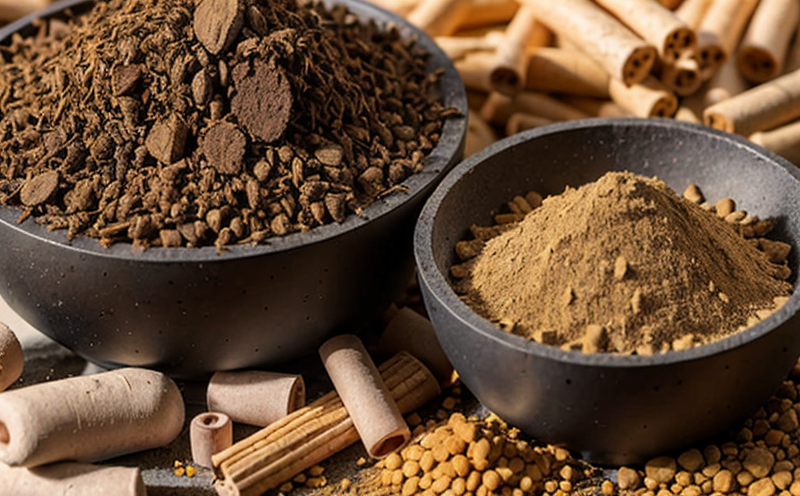ASTM E871 Moisture Analysis of Biomass
The ASTM E871 standard is widely used for determining the moisture content in biomass materials, a critical parameter for ensuring quality and consistency in renewable energy applications. Moisture content significantly impacts the calorific value of biomass fuels, which directly affects the efficiency of power generation processes. Accurate moisture analysis is essential to ensure that biomass resources are optimized for both environmental sustainability and economic viability.
Biomass materials like wood chips, agricultural residues, and dedicated bioenergy crops vary widely in their composition, making precise measurement of moisture content crucial. The ASTM E871 method provides a standardized approach that ensures consistent results across different laboratories. This standardization is particularly important for industries relying on biomass as a renewable energy source, such as power plants, biofuel producers, and agricultural waste management facilities.
The ASTM E871 procedure involves drying the sample in an oven to a constant weight, then calculating the moisture content based on the difference between the initial wet mass and the final dry mass. The key steps include:
- Sampling: Collecting representative samples from the biomass material.
- Preparation: Ensuring that the sample is homogenous and free of foreign materials.
- Drying: Drying the sample in an oven at a specified temperature (105°C ± 3°C) until it reaches constant weight.
- Weighing: Accurately weighing both the wet and dry samples to determine the moisture loss.
The precision of this method is critical for industries that rely on biomass as a feedstock. For instance, in power generation plants, even small variations in moisture content can lead to significant differences in energy output. Additionally, accurate moisture analysis helps in optimizing the combustion process, reducing emissions, and improving overall efficiency.
Understanding the moisture content of biomass also aids in its storage and transport logistics. Higher moisture levels can lead to spoilage or increased weight, which is undesirable for economic reasons. Conversely, excessively low moisture can result in poor fuel quality. ASTM E871 ensures that these parameters are consistently measured across different batches and sources, providing a reliable basis for decision-making.
The ASTM E871 standard is not only used in the laboratory setting but also in field applications where rapid, accurate measurements are necessary. Portable moisture analyzers based on this method allow for on-site testing, ensuring that samples meet the required specifications before they reach the processing stage. This real-time data helps in adjusting feedstock quality to meet energy production targets.
In conclusion, ASTM E871 is a cornerstone of biomass quality control and optimization, providing a reliable methodology for moisture analysis that impacts various aspects of renewable energy generation. Its wide applicability across different sectors underscores the importance of this standard in ensuring consistent performance and efficiency in bioenergy applications.
Why It Matters
The accuracy and reliability of ASTM E871 moisture analysis are paramount for several reasons:
- Energy Efficiency: Moisture content directly affects the calorific value, which is a key determinant in energy production efficiency. Inaccurate measurements can lead to underestimation or overestimation of available energy.
- Emissions Reduction: By optimizing fuel quality through precise moisture measurement, emissions can be minimized, contributing positively to environmental sustainability goals.
- Cost Management: Ensuring that biomass resources are not wasted due to excess water content helps in maintaining optimal costs for production and transportation.
- Quality Assurance: Consistent quality control ensures that the output from bioenergy plants meets international standards, enhancing customer satisfaction and trust.
The ASTM E871 standard is essential for industries that depend on biomass as a renewable energy source. It provides a clear pathway to achieving consistent, high-quality results across different laboratories, which is crucial for regulatory compliance and market competitiveness.
Benefits
The implementation of ASTM E871 moisture analysis offers numerous benefits:
- Enhanced Process Control: Real-time data from portable moisture analyzers based on this standard allows for immediate adjustments to fuel quality, optimizing the combustion process.
- Informed Decision-Making: Accurate measurements enable stakeholders in renewable energy production to make informed decisions regarding resource allocation and operational strategies.
- Regulatory Compliance: By adhering to international standards like ASTM E871, companies can ensure compliance with local and international regulations related to biomass quality.
- Improved Efficiency: Precise moisture content measurement ensures that energy production processes are optimized, leading to higher yields and lower operational costs.
The standard also supports the development of consistent bioenergy products that meet market demands, thereby enhancing the overall performance and reliability of renewable energy systems.
Why Choose This Test
Selecting ASTM E871 for moisture analysis in biomass resources offers several advantages:
- Standardization: The method provides a universally accepted standard, ensuring consistency and repeatability across different laboratories.
- Rigorous Validation: ASTM standards undergo rigorous validation processes to ensure accuracy and reliability of the results.
- International Recognition: Compliance with ASTM E871 is recognized globally, enhancing marketability and trust in bioenergy products.
- User-Friendly: The procedure is straightforward and can be adapted for both laboratory and field applications, making it accessible to a wide range of users.
The ASTM E871 standard is designed to meet the specific needs of biomass processing industries. Its robustness ensures that moisture content measurements are accurate and reliable, contributing significantly to the overall quality control process. This reliability is crucial for maintaining consistent product quality and meeting stringent regulatory requirements.





